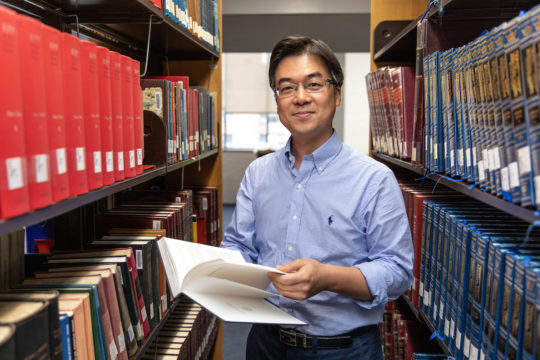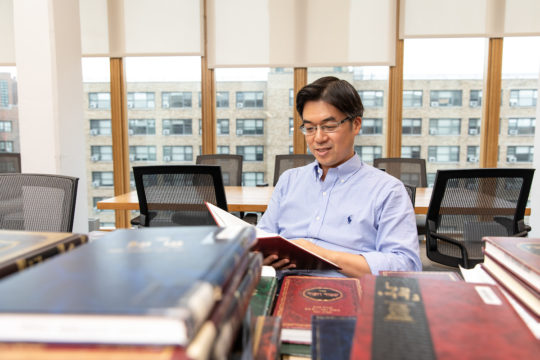Message From Our President

Dear Students, Faculty, Staff and Friends,
I am pleased to present to you this Guide to our plans for the upcoming fall semester and reopening of our campuses. In form and in content, this coming semester will be like no other. We will live differently, work differently and learn differently. But in its very difference rests its enormous power.
The mission of Yeshiva University is to enrich the moral, intellectual and spiritual development of each of our students, empowering them with the knowledge and abilities to become people of impact and leaders of tomorrow. Next year’s studies will be especially instrumental in shaping the course of our students’ lives. Character is formed and developed in times of deep adversity. This is the kind of teachable moment that Yeshiva University was made for. As such, we have developed an educational plan for next year that features a high-quality student experience and prioritizes personal growth during this Coronavirus era. Our students will be able to work through the difficulties, issues and opportunities posed by our COVID-19 era with our stellar rabbis and faculty, as well as their close friends and peers at Yeshiva.
To develop our plans for the fall, we have convened a Scenario Planning Task Force made up of representatives across the major areas of our campus. Their planning has been guided by the latest medical information, government directives, direct input from our rabbis, faculty and students, and best practices from industry and university leaders across the country. I am deeply thankful to our task force members and all who supported them for their tireless work in addressing the myriad details involved in bringing students back to campus and restarting our educational enterprise.
In concert with the recommendations from our task force, I am announcing today that our fall semester will reflect a hybrid model. It will allow many students to return in a careful way by incorporating online and virtual learning with on-campus classroom instruction. It also enables students who prefer to not be on campus to have a rich student experience by continuing their studies online and benefitting from a full range of online student services and extracurricular programs.
In bringing our students back to campus, safety is our first priority. Many aspects of campus life will change for this coming semester. Gatherings will be limited, larger courses will move completely online. Throughout campus everyone will need to adhere to our medical guidelines, including social distancing, wearing facemasks, and our testing and contact tracing policies. Due to our focus on minimizing risk, our undergraduate students will begin the first few weeks of the fall semester online and move onto the campus after the Jewish holidays. This schedule will limit the amount of back and forth travel for our students by concentrating the on-campus component of the fall semester to one consecutive segment.
Throughout our planning, we have used the analogy of a dimmer switch. Reopening our campuses will not be a simple binary, like an on/off light switch, but more like a dimmer in which we have the flexibility to scale backwards and forwards to properly respond as the health situation evolves. It is very possible that some plans could change, depending upon the progression of the virus and/or applicable state and local government guidance.
Before our semester begins, we will provide more updates reflecting our most current guidance. Please check our website, yu.edu/fall2020 for regular updates. We understand that even after reading through this guide, you might have many additional questions, so we will be posting an extensive FAQ section online as well. Additionally, we will also be holding community calls for faculty, students, staff and parents over the next couple of months.
Planning for the future during this moment has certainly been humbling. This Coronavirus has reminded us time and time again of the lessons from our Jewish tradition that we are not in full control of our circumstances. But our tradition also teaches us that we are in control of our response to our circumstances. Next semester will present significant challenges and changes. There will be some compromises and minor inconveniences--not every issue has a perfect solution. But faith and fortitude, mutual cooperation and resilience are essential life lessons that are accentuated during this period. And if we all commit to respond with graciousness, kindness, and love, we can transform new campus realities into profound life lessons for our future.
Deeply rooted in our Jewish values and forward focused in preparing for the careers and competencies of the future, we journey together with you, our Yeshiva University community, through these uncharted waters. Next year will be a formative year in the lives of our students, and together we will rise to the moment so that our students will emerge stronger and better prepared to be leaders of the world of tomorrow.
Best Wishes,
Ari Berman

 What inspired you to go into Jewish studies?
This question is deeply related to my academic journey before I came to Yeshiva University, where I learned not only the theological doctrines of Christianity but also the importance of their philosophical frameworks. This guided me, among other things, to study Jewish education at Hebrew University of Jerusalem in Israel. Through these studies, I was able to see myself and the world in a new and broader perspective in terms of theological, philosophical, and educational dimensions.
What drew you to Yeshiva University?
I would say that the most important idea that led me to study at YU is Torah lishmah [study of Torah for Torah’s sake]. What a fascinating concept this is. I believe that it is the best idea I have ever encountered in my academic and religious journey. In fact, what made me want to go to YU is the book Torah Lishmah: Torah for Torah’s Sake in the Works of Rabbi Chaim of Volozhin, written by former YU President Rabbi Dr. Norman Lamm. I read it several times before I came to YU. Even if it seems exaggerated, I can say that Torah is in my heart with burning love and that this is why I came to study here.
Any standout courses or lessons learned while at Revel?
The most impressive lesson since I came to Revel was in an individual tutorial with Dr. Jonathan Dauber, associate professor of Jewish mysticism. We read and analyzed the original Hebrew texts of the Nefesh HaChaim, written by Rabbi Chaim of Volozhin, who discusses the idea of Torah lishmah. It made me realize not only the deep theological and philosophical meanings of Torah, but it also offered me a great spiritual and intellectual enjoyment. It gave me the conviction that I would become a better student studying Torah in the spirit of lishmah.
What inspired you to go into Jewish studies?
This question is deeply related to my academic journey before I came to Yeshiva University, where I learned not only the theological doctrines of Christianity but also the importance of their philosophical frameworks. This guided me, among other things, to study Jewish education at Hebrew University of Jerusalem in Israel. Through these studies, I was able to see myself and the world in a new and broader perspective in terms of theological, philosophical, and educational dimensions.
What drew you to Yeshiva University?
I would say that the most important idea that led me to study at YU is Torah lishmah [study of Torah for Torah’s sake]. What a fascinating concept this is. I believe that it is the best idea I have ever encountered in my academic and religious journey. In fact, what made me want to go to YU is the book Torah Lishmah: Torah for Torah’s Sake in the Works of Rabbi Chaim of Volozhin, written by former YU President Rabbi Dr. Norman Lamm. I read it several times before I came to YU. Even if it seems exaggerated, I can say that Torah is in my heart with burning love and that this is why I came to study here.
Any standout courses or lessons learned while at Revel?
The most impressive lesson since I came to Revel was in an individual tutorial with Dr. Jonathan Dauber, associate professor of Jewish mysticism. We read and analyzed the original Hebrew texts of the Nefesh HaChaim, written by Rabbi Chaim of Volozhin, who discusses the idea of Torah lishmah. It made me realize not only the deep theological and philosophical meanings of Torah, but it also offered me a great spiritual and intellectual enjoyment. It gave me the conviction that I would become a better student studying Torah in the spirit of lishmah.
 What project are you working on at the moment?
My primary work right now concerns how philosophical concepts like wisdom and logos in relation to Torah were developed in the Biblical texts with Jewish and Christian sources. I want to understand the profoundly shared philosophical backgrounds of Judaism and Christianity before they parted ways. Both religions have crucial understandings of messianic redemption in the future, and both need to maintain a thoughtful dialogue in recognition of their philosophical commonalities based on the Hebrew Bible. This is will be the starting point for my doctoral thesis.
What are your plans when you return to South Korea?
I plan to return to Korea after finishing my doctoral study to teach college students in courses related to Jewish studies at a seminary or university. I want to introduce Jewish learning methodologies, such as chavruta [studying with a partner] and talking to each other freely and actively about interesting subjects, to my country and contextualize them in the Korean educational system, which sometimes focuses too much on rote memory. I strongly believe this kind of study eventually cannot only achieve a meaningful academic excellence but also cultivate in a person a sound personality and identity which can support his community and society.
I also have a dream of establishing an academic center for Jewish-Christian dialogue in South Korea, which would connect institutions like Yeshiva University and organizations focused on Jewish-Christian relations in the world. I believe now is the right time to start a project like this, and that it will have an amazing outcome.
What project are you working on at the moment?
My primary work right now concerns how philosophical concepts like wisdom and logos in relation to Torah were developed in the Biblical texts with Jewish and Christian sources. I want to understand the profoundly shared philosophical backgrounds of Judaism and Christianity before they parted ways. Both religions have crucial understandings of messianic redemption in the future, and both need to maintain a thoughtful dialogue in recognition of their philosophical commonalities based on the Hebrew Bible. This is will be the starting point for my doctoral thesis.
What are your plans when you return to South Korea?
I plan to return to Korea after finishing my doctoral study to teach college students in courses related to Jewish studies at a seminary or university. I want to introduce Jewish learning methodologies, such as chavruta [studying with a partner] and talking to each other freely and actively about interesting subjects, to my country and contextualize them in the Korean educational system, which sometimes focuses too much on rote memory. I strongly believe this kind of study eventually cannot only achieve a meaningful academic excellence but also cultivate in a person a sound personality and identity which can support his community and society.
I also have a dream of establishing an academic center for Jewish-Christian dialogue in South Korea, which would connect institutions like Yeshiva University and organizations focused on Jewish-Christian relations in the world. I believe now is the right time to start a project like this, and that it will have an amazing outcome.